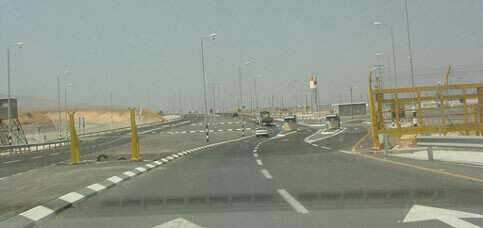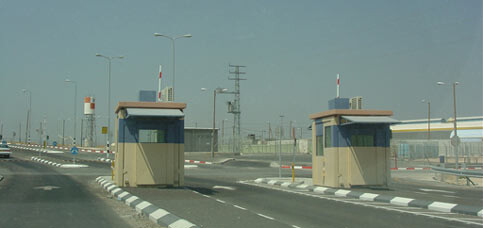B'Tselem 13 February 2006

The ghetto gates of the check point to Beisan are closed. (StoptheWall.org)
Israel imposes severe restrictions on the movement of Palestinians in the Jordan Valley , the eastern strip of the West Bank, which it has in effect annexed. This is the finding of B’Tselem’s recent research. As a rule, the army forbids the entry of Palestinians to the Jordan Valley, and only allows entry of those Palestinians listed as residents of this area. Severing the Jordan Valley from the rest of the West Bank severely violates the human rights of the Palestinian population. These measures were taken without any government decision or notice to the public.
Testimonies given to B’Tselem indicate that the IDF forbids the movement of Palestinians along Route 90, which runs the length of the Jordan Valley, and directs Palestinian traffic to side roads. Palestinians who have farmland in the valley, but do not live there, are separated from their land. The closing of the Jordan Valley has caused many Palestinians who live in villages bordering the valley and work in agriculture there to lose their source of livelihood. Residents of Palestinian villages north of the Jericho enclave are not able to host relatives and friends who live outside the valley or in Jericho. Women who married valley residents and moved there, but did not change their address in their identity cards, cannot leave their villages without fear that they will not be allowed to return home.
In recent years, Israel has set up seven permanent checkpoints west of the Jordan Valley, four of them around the Jericho enclave. In 2005, the army greatly increased the restrictions on Palestinians wanting to cross the checkpoints. In response to an inquiry by B’Tselem, which the organization received in January 2006, the IDF Spokesperson’s Office stated that crossing these checkpoints is allowed, in general, only to residents of the Jordan Valley who have identity cards in which their address is one of the villages in the valley. Other residents of the West Bank are allowed to cross only if they have a special permit issued by the Civil Administration, or in “humanitarian cases.” This prohibition does not apply to the entry of residents of Jericho , but travel from Jericho north to other parts of the valley, including travel by residents of Jericho, is forbidden except by permit. “Palestinians caught in the Jordan Valley without a permit,” the IDF Spokesperson’s Office said, “are handed over to the police.”
It should be noted that, in the IDF Spokesperson’s Office’s response, distinction was made between the ” territory of Judea and Samaria ” and “the Jordan Valley,” indicating that Israel does not view the two areas as a single territorial unit. B’Tselem wrote to the IDF’s legal advisor for the West Bank to ascertain the basis for this distinction, and to learn if military orders had been issued to formalize the closing of the Jordan Valley to Palestinians and the arrest of persons who remain there without a permit. To date, B’Tselem has not received a reply to its inquiry.
Israel’s permit regime in the valley, together with statements of senior officials, give the impression that the motive underlying Israel ‘s policy is not based on military-security needs, but is political: the de facto annexation of the Jordan Valley. This annexation, similar to the de facto annexation of broad tracts of land west of the separation barrier, constitutes a flagrant breach of the right of the Palestinian people to self-determination.
Background
Israel initially planned to construct an eastern barrier to separate the Jordan Valley from the rest of the West Bank. These plans were abandoned following international criticism of the route of the Separation Barrier as a whole, and the High Court of Justice’s decision of June 2004. It is now apparent that what Israel was unable to achieve by a separation barrier is being realized through other means. For several months, Israel has instituted a regime of permits and harsh restrictions on the movement of Palestinians. These acts have served as a substitute for the construction of a physical barrier, creating a situation in the Jordan Valley almost identical to that of the “seam zone” between the separation barrier and the Green Line.

A crucial part of the ghetto system that controls and imprisons the Palestinians in the Jordan Valley, the racist check point leave passage of Palestinians and their goods to the random rulings of the Occupation. (StoptheWall.org)
Since the occupation of the West Bank began, in 1967, every Israeli government has considered the Jordan Valley to be the “eastern border” of Israel and has sought to annex it. To strengthen its hold on the area, Israel has established 26 settlements and five Nahal brigade encampments there, which house some 7,500 residents. Over the years, most of the area has been declared state land and was attached to the jurisdictional area of the Jordan Valley Regional Council, which includes most of the settlements in the valley. As part of the Oslo Agreements, the Jordan Valley (except for the enclave around Jericho ) was classified as Area C, in which Israel maintained complete control. Recently, acting Prime Minister Ehud Olmert stated in a TV interview that the Jordan Valley will remain under Israeli control in any future agreement.
Testimony: Palestinian mother prevented from visiting her married daughter in the Jordan Valley, Ni’meh Abu Zaharah, mother of 11 (January 2006)
“Before the intifada, my husband and I worked in the Jordan Valley picking fruit. We were paid on a day-by-day basis. We had worked there for more than a decade. Many residents of our village worked for daily wages in the Jordan Valley because our village is small and jobs aren’t available. In addition to the wages, our employers also gave us some of the harvest, which meant that we saved on buying fruits and vegetables.
About three years ago, the Israeli army began to prohibit non-residents of the valley to cross the Hamra checkpoint. When they did that, we lost our source of livelihood. Our situation has deteriorated badly. My husband looked for work but couldn’t find any. He borrowed money to buy a car that he uses to transport goods to the grocery stores in the village, and to transport dairy products during the spring. But this work didn’t bring in enough money, and he has been unable to repay the loan.
I don’t know why the army refuses to let us go to the Jordan Valley . I think that they simply want to humiliate us. Maybe they want us to starve to death.
I have a daughter, Hiba, who is seventeen. In 2003, she married a man from Jiftlik. Since they got married, nobody in my family has been able to visit her, not even during the holidays, because the army doesn’t let us cross the Hamra checkpoint. Even when my daughter gave birth to her first child, I did not succeed in visiting her and my grandchild to see how they were. I didn’t get to see my daughter until two months after she gave birth, when she came to us.
About two weeks ago, she gave birth to her second child, by Caesarean section, but I can’t visit her. I went to the checkpoint and prayed to God that the soldiers would let me cross, but they didn’t. I told one of the soldiers at the checkpoint that my daughter lived in Jiftlik and that she had given birth by Caesarean section, and that the only thing I wanted was to see her. I begged him to let me cross, and promised to return within an hour, but he didn’t let me cross. I told him that I would leave my ID card with him as a guaranty that I would return when he told me. He refused this offer as well. I returned home crying, I was so distressed.”
Ni’meh ‘Ali Abu Zahara, 45, is married, unemployed, and a resident of a-Nassariya, Nablus District. Her testimony was given to Salma Deba’i in a-Nassariya, on 22 January 2006.
Related Links